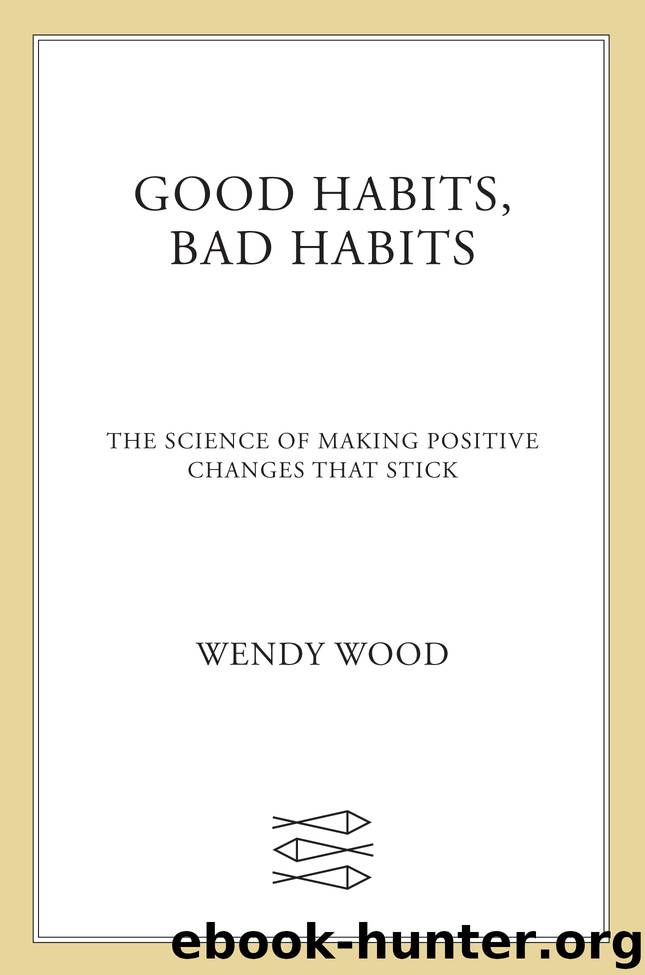Good Habits, Bad Habits : The Science of Making Positive Changes That Stick (9781250159083) by Wood Wendy

Author:Wood, Wendy
Language: eng
Format: epub
Publisher: Macmillan
* * *
There’s an old concept in economics called creative destruction. It captures the inevitable moments of stress and fracture created in a market economy. Those moments are immediately painful, especially to those directly affected. Stocks crash. Jobs are lost. Whole industries vanish. But from the privileged perspective of an observer, this destruction also contains the seeds of new growth. Innovation can look like failure—ask anyone in Silicon Valley. It’s practically the ethos there.
Your habitual self is a crucible of this kind of destruction. After you see how, you’ll be able to control the rate of both destruction and creation.
Once you get into the habit of driving to work, it’s pretty automatic. You just get into your car and follow the route you always take. It requires effort to do something else. To take the bus, for example, you have to figure out bus schedules, fare costs, whether you need a special transit card, and how early to wake up in the morning. You don’t face these decisions when you follow habit cues that keep you driving.
Enter the greatest discontinuity of all: moving. A study compared the transportation habits of 69 employees at a small English university, all of whom had moved in the prior year, to those of 364 established residents.6 The researchers started by assessing the environmental values of all participants, and found that they held a variety of attitudes—some were quite eco-conscious, and others didn’t care very much at all. The town had convenient transit options to get to work at the university, including a good bus system, along with cycling and walking paths. No one had to drive. Nonetheless, 60 percent of longtime residents drove to campus. Strong environmentalists as well as those who did not care all mostly drove their cars.
The recent movers were different—in a good way. Among those who said they were highly concerned about the environment, only 37 percent of trips to campus were in cars. These newcomers were more likely to take the bus, bike, or walk. When they had no habit to follow and were forced to make new decisions, their green values won out. Among recent movers who said they were not concerned about the environment, 73 percent drove. In the absence of habit, they were also true to their values. They did not try other, environmentally friendly forms of transit.
In new contexts, we choose behaviors that fit our current goals. We cannot easily repeat what we did in the past, and we have to more thoughtfully synchronize our actions with who we are right now. Another way of looking at this is that the discontinuity of moving actually made people own up to—and act on—their stated beliefs. Discontinuities can make us into more genuine, integrated versions of ourselves.
While we stand to benefit from discontinuities, most of us don’t welcome them into our lives or seek them out. At best, you probably feel ambivalent about such life changes. And you should, given the double nature of discontinuity. While freeing
Download
This site does not store any files on its server. We only index and link to content provided by other sites. Please contact the content providers to delete copyright contents if any and email us, we'll remove relevant links or contents immediately.
The Art of Thinking Clearly by Rolf Dobelli(10455)
Mindhunter: Inside the FBI's Elite Serial Crime Unit by John E. Douglas & Mark Olshaker(9324)
Change Your Questions, Change Your Life by Marilee Adams(7761)
Nudge - Improving Decisions about Health, Wealth, and Happiness by Thaler Sunstein(7693)
Mastermind: How to Think Like Sherlock Holmes by Maria Konnikova(7323)
The Power of Now: A Guide to Spiritual Enlightenment by Eckhart Tolle(5758)
Men In Love by Nancy Friday(5234)
Altered Sensations by David Pantalony(5094)
Factfulness: Ten Reasons We're Wrong About the World – and Why Things Are Better Than You Think by Hans Rosling(4736)
The Confidence Code by Katty Kay(4251)
Thinking in Bets by Annie Duke(4218)
Man and His Symbols by Carl Gustav Jung(4131)
The Worm at the Core by Sheldon Solomon(3486)
Why Buddhism is True by Robert Wright(3446)
Liar's Poker by Michael Lewis(3441)
Three Women by Lisa Taddeo(3424)
The Inner Life of Animals by Peter Wohlleben(3311)
Descartes' Error by Antonio Damasio(3271)
How Music Works by David Byrne(3261)
